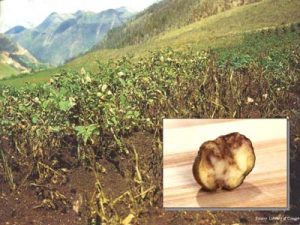
Potato blight has shown resistance to Phenylamides. Photo:potatomuseum.com
Fungicides are important tools for preventing and managing plant disease. Unlike insecticides and some herbicides which kill established insects or weeds, fungicides are most commonly applied to protect healthy plants before infection occurs. Resistance to fungicides is one of many possible causes of poor disease control (see Is Resistance to Blame?). Resistance refers to a situation where a given fungicide once controlled a particular fungal population but, after one or more applications, that fungicide no longer controls that population. To understand the process of selection that leads to fungicide resistance see Understanding Resistance. This module describes how fungicides work, the factors that contribute to fungicide resistance, and how resistance can be delayed or managed.

Carboxanilide resistant Barley loose smut Photo: I. R. Evans
This module was expertly reviewed by:
Dr. Turner Sutton, Professor Emeritus, Department of Plant Pathology, NC State University, and,
Dr. Allison Talley, Syngenta Crop Protection
Compiled by Dr. Wayne Buhler
